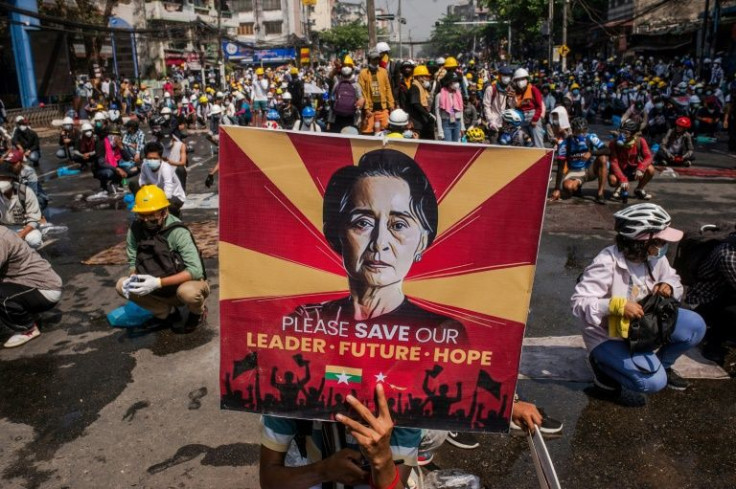Tatmadaw Control Myanmar New Normal For Regional Countries, US

Myanmar is unusual following years of a quasi-democracy and the Feb. 1 coup d'état last year. It is investment, political and geopolitical influence that are overriding interest of the ASEAN, U.S., China, and India in Myanmar as its armed forces are subjugating an entire population.
For the global powers, the priority is a totally pliant regime though peaceful protests and armed rebellion do take place across Myanmar in the slight hope of international intervention. Myanmar's parallel shadow government, National Unity Government, formed after a military coup more than a year ago, is soliciting international support, which has proved hard to come by.
The Myanmar military has crushed popular resistance with airstrikes and artillery and tank attacks while armed ethnic resistance in many parts of the country is growing. A national strike against the junta in the Southeast Asian nation has plagued the economy and crippled the health care system in the midst of the pandemic.
Since the coup on Feb. 1, 2021, the military has killed about 1,700 protesters and more than 520,000 people have been displaced, most of whom are women and girls, according to U.N.
Formed two months after the coup, the NUG comprised members of the National League for Democracy party of Nobel Laureate Aung San Suu Kyi which won majority seats in the 2020 parliament polls before being forced out of the country's leadership by the junta.
The military, which ruled the nation for nearly 50 years before sharing power with civilians in 2010, seized full control again with the coup last year. The NUG efforts to gain recognition as a legitimate governing body to restore democracy have fallen on the deaf of the international community. Suu Kyi, who has been detained, serves as a state counselor under the shadow government.
A court sentenced April 27 the ousted civilian leader to five years in prison on graft charges of accepting $1.3 million in gold bars and cash from a close political ally in a closed-door trial. Last year, U Phyo Min Thein, former chief minister of Yangon, Myanmar's largest city, publically admitted that Suu Kyi accepted $600,000 in cash and about 25 pounds of gold from him. Thein said that he gave the gifts to be in her good books.
Nobel Peace Prize winner of 1991 has been charged with 17 criminal counts. Earlier, she was convicted on five charges and was awarded a six-year jail term. If found guilty on all charges, which her defenders say are fabricated, 76-year- old will face as much as 163 years in prison. That is the end of her story.
Suu Kyi's latest conviction comes 15 days ahead of the second special meeting of the ASEAN-U.S., slated for May 12. Myanmar is a member of the 10-member bloc. This time, President Joe Biden is keen on courting ASEAN leadership at the in-person meeting in Washington.
Fresh from the one-year-old coup, junta chief General Min Aung Hlaing is unwelcome at the White House party which swears by democracy and rule-based order. But it is doubtful that any strong action will come from the ASEAN meeting as the Biden administration is using the special two-day summit to market re-engagement with the U.S. as a bulwark against China's expansionism in the Indo-Pacific and Russia's imperial aspirations in East Europe.
The backing of entire Southeast Asia, with a population of 656 million people that is bigger than Europe, perfectly fits into the U.S. scheme of things.
On its part, the ASEAN has shown little interest in restoring democracy in Myanmar. Earlier, ASEAN leaders met in Indonesia with General Hlaing. Though they agreed on a five-point agenda to curb unmindful violence in the country, General Hlaing paid no attention to it and ASEAN leaders failed to follow it up and the junta continued to beat back the rising nationwide armed resistance to its rule.
ASEAN special envoys have failed miserably in their mission to meet with Suu Kyi who was under house arrest in undisclosed locations near the capital Naypyidaw and ASEAN has not initiated any meaningful talk with the pro-democracy National Unity Government so far.
There were many calls to suspend Myanmar from the ASEAN until a return to democratic rule. But the ASEAN won't do that.
Though the U.S. and EU have slapped sanctions on a few military generals, and have urged the military to reverse course, China's only concern is its economic interests in Myanmar. For China, neighbor Myanmar serves as access to the Indian Ocean basin and an infrastructure transit point. The ongoing ethnic conflict is mainly centered around the Kachin and Shan states, two remote regions of Myanmar bordering China's Yunnan province.
Another neighbor, India too has made Myanmar a focal point of its economic strategies. For smooth and economical shipping of its goods, India has built a combination of highways, river ports, and deep-water ports. Besides, Myanmar figures prominently as part of India's Act East policy.
The competition between two Asian superpowers is apparent in Myanmar and two Asian giants are constructing competing ports and infrastructure at the same time in Myanmar.
Both Thailand and Japan also have economic interests, too. Currently, they are major players in the development of the Dawei port, the nerve center of Dawei Special Economic Zone which includes a 138 km road from Dawei in Myanmar to Kanchanaburi in Thailand. The project allows cargo to bypass the Malacca Straits, one of the most heavily congested commercial shipping lanes in the world.
Therefore, normalcy to the ASEAN, China, India, and the U.S. means the Tatmadaw (the army called in the local language) in control in Myanmar.
























